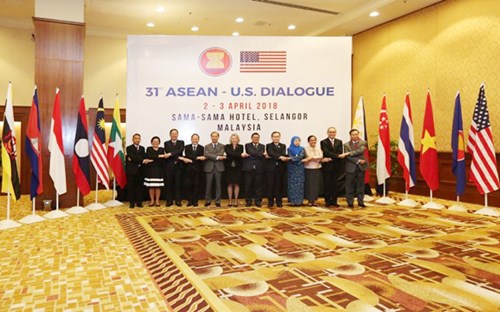Participating representatives of the U.S. and ASEAN celebrated the growth of political, security, economic and cultural ties between the sides, reflected through implementation outcomes of their action plan for 2016 – 2020. The plan saw 83 out of its 95 activities and projects carried out.
A number of fruitful U.S.-supported programs in ASEAN included the Trade & Investment Framework Agreements, Expanded Economic Engagement (E3) Initiative, U.S.-ASEAN Connectivity through Trade and Investment project, Young Southeast Asian Leaders initiative, and Lower Mekong Initiative.
    |
 |
|
Photo: asean.usmission.gov |
The ASEAN member countries praised the Trump Government for maintaining its commitment to the bloc and stated their willingness to work with the nation to increase ASEAN self-reliance and realize the ASEAN Community Vision 2025.
ASEAN and the U.S. agreed to effectively implement their action plan for 2016-2020, particularly in such realms as free trade-investment, digital economics, connectivity, marine cooperation, education, people-to-people exchange, and response to nontraditional security threats.
Acting Assistant Secretary for East Asian and Pacific Affairs Susan Thornton highlighted the importance of ASEAN in the U.S. policy on Asia-Pacific.
Voicing her support toward the bloc’s solidarity, unity, and centrality in the regional architecture, the official said the U.S. will continue helping ASEAN tackle nontraditional security challenges like marine security, cybercrime, and terrorism.
Thornton introduced the U.S.’s idea of a free and open Indo-Asia-Pacific strategy, noting that through it, the US wants to work with ASEAN and other partners in the region to build a rules-based order of equality, free trade and investment.
The U.S. welcomes the negotiation between the bloc and China on the Code of Conduct of Parties in the East Sea (South China Sea) in line with international law, including the UNCLOS, she added.
She affirmed that the U.S. supports peaceful settlement of disputes in the East Sea based on international law, stressing the importance of free navigation and overflight on the waters, respect to territorial sovereignty, and non-militarization.
Addressing the event, Deputy Foreign Minister Nguyen Quoc Dung said Vietnam attached importance to the ASEAN-U.S. strategic partnership.
The Vietnamese diplomat lauded the sides’ implementation of their action plan for 2016-2020 and the U.S.’s practical moves to keep commitments to and foster cooperation with ASEAN.
On behalf of the bloc member states, Dung affirmed ASEAN’s stance and principles on the East Sea issue.
He listed opportunities and challenges that ASEAN, the U.S., and other dialogue partners of the bloc need to work together to address, including piracy, human and drug trafficking, illegal fishing, marine environmental protection, and peaceful settlement of disputes.
He added the collaboration can be achieved through regional frameworks and mechanism like the ASEAN Regional Forum, East Asia Summit, and Expanded ASEAN Maritime Forum, based on the 1982 United Nations Convention on the Law of the Sea (UNCLOS) to maintain a peaceful and stable environment in the region.
Source: VNA